

Howard Zinn on Civil Disobedience. Civil Disobedience (featuring Dr. Timothy George) ACLU University Protest. Civil Disobedience and the Law. Examples of Civil Disobedience. Civil Disobedience (Stanford Encyclopedia of Philosophy/Spring 2010 Edition) First published Thu Jan 4, 2007; substantive revision Wed Dec 23, 2009.
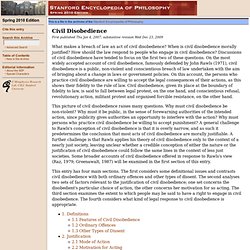
Rediscovering Civil Disobedience. In Dr.
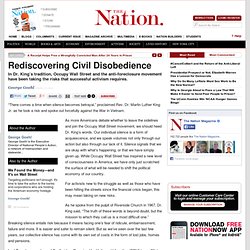
King’s tradition, Occupy Wall Street and the anti-foreclosure movement have been taking the risks that successful activism requires. “There comes a time when silence becomes betrayal,” proclaimed Rev. Dr. Martin Luther King Jr. as he took a risk and spoke out forcefully against the War in Vietnam. About the Author George Goehl George Goehl is the Executive Director of National People’s Action, a network of metropolitan and statewide... Also by the Author Targeting politicians isn't enough. In The Life Media. Electronic Civil Disobedience. Mohandas K. "Mahatma" Gandhi on Nonviolent Action & Civil Disobedience: Gandhi-King Season Cooperation Circles - Nonviolent Responses to Terror & Injustice. The Role of Civil Disobedience in Democracy. Civil Disobedience is the act of disobeying a law on grounds of moral or political principle.
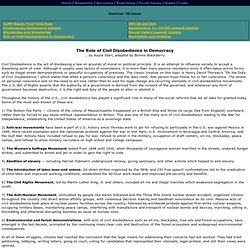
It is an attempt to influence society to accept a dissenting point of view. Although it usually uses tactics of nonviolence, it is more than mere passive resistance since it often takes active forms such as illegal street demonstrations or peaceful occupations of premises. The classic treatise on this topic is Henry David Thoreau's "On the Duty of Civil Disobedience," which states that when a person's conscience and the laws clash, that person must follow his or her conscience. The stress on personal conscience and on the need to act now rather than to wait for legal change are recurring elements in civil disobedience movements. The U.S. Throughout the history of the U.S., civil disobedience has played a significant role in many of the social reforms that we all take for granted today. 5) The introduction of labor laws and unions. Reasons some protesters choose non-cooperation: Civil Disobedience Manual. Civil Disobedience" Thoreau's Civil Disobedience - with annotated text.
Civil Disobedience Summary. Thoreau opens his essay with the motto "That government is best which governs least.
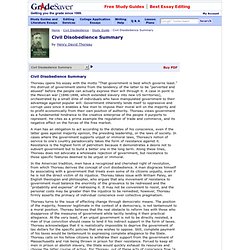
" His distrust of government stems from the tendency of the latter to be "perverted and abused" before the people can actually express their will through it. A case in point is the Mexican war (1846-1848, which extended slavery into new US territories), orchestrated by a small élite of individuals who have manipulated government to their advantage against popular will. Government inherently lends itself to oppressive and corrupt uses since it enables a few men to impose their moral will on the majority and to profit economically from their own position of authority. Analysis Section 1. Section I: Government and Democracy Summary Thoreau opens his essay with the motto "That government is best which governs least.
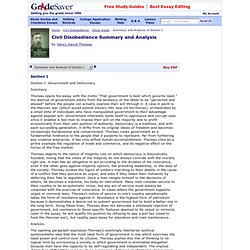
" His distrust of government stems from the tendency of the latter to be "perverted and abused" before the people can actually express their will through it. A case in point is the Mexican war (which would extend slavery into new US territories), orchestrated by a small élite of individuals who have manipulated government to their advantage against popular will. Government inherently lends itself to oppressive and corrupt uses since it enables a few men to impose their will on the majority and to profit economically from their own position of authority.
Analysis Section 2. Section II: Resistance to Civil Government Summary In the American tradition, men have a recognized and cherished right of revolution.
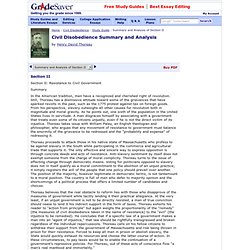
Still, Thoreau has a dismissive attitude toward some of the grievances that have sparked revolts in the past, such as the 1775 protest against tax on foreign goods. From his perspective, slavery outweighs all other causes for revolution both in magnitude and moral gravity. As he points out, one sixth of the population in the United States lives in servitude. Analysis Section 3. Section III: A Night in Prison Summary After refusing to pay the poll tax for six years, Thoreau is thrown into jail for one night.
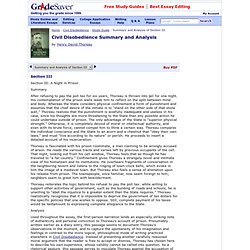
Analysis Section 4. Section IV: Politicians and the People Summary Why submit other people to one's own moral standard?
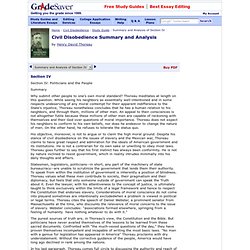
Thoreau meditates at length on this question. While seeing his neighbors as essentially well-intentioned and in some respects undeserving of any moral contempt for their apparent indifference to the State's injustice, Thoreau nonetheless concludes that he has a human relation to his neighbors, and through them, millions of other men. An appeal to their consciences is not altogether futile because these millions of other men are capable of reckoning with themselves and their God over questions of moral importance. His objective, moreover, is not to argue or to claim the high moral ground.
Civil Disobedience Themes. The right to resistance Thoreau affirms the absolute right of individuals to withdraw their support from a government whose policies are immoral or unjust.
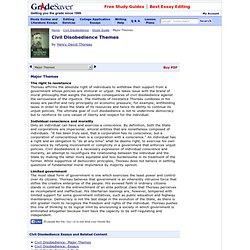
He takes issue with the brand of moral philosophy that weighs the possible consequences of civil disobedience against the seriousness of the injustice. The methods of resistance Thoreau condones in his essay are pacifist and rely principally on economic pressure; for example, withholding taxes in order to drain the State of its resources and hence its ability to continue its unjust policies.